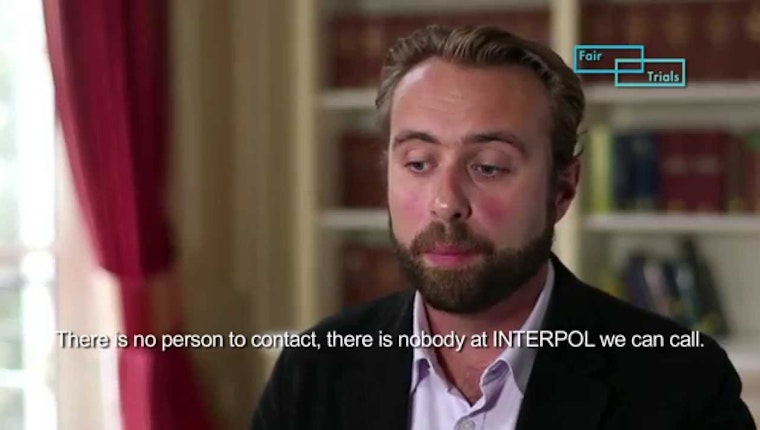Is Interpol Vulnerable to Political Abuse?
By Libby McVeigh & Alex Tinsley

Last week, news emerged that Hayat Boumediene, a suspect linked to the Charlie Hebdo killings and France’s “most wanted woman,” had escaped to Syria via Turkey. Against this backdrop, it is important to acknowledge the role of Interpol, the international policing organization, which can rapidly circulate alerts for wanted suspects across the globe for the purpose of seeking extradition.
Yet it is of grave concern that trust in Interpol—and with that, its effectiveness—is being undermined. Around the world, governments accustomed to using criminal law for political ends are using Interpol’s systems to pursue their critics, including human rights activists, political opponents, and even journalists.
Interpol’s constitution includes clear commitments to human rights and political neutrality. And the organization has scrutinized several high-profile attempts to publish wanted alerts that appeared to be politically motivated.
On January 12, for instance, Interpol accepted Ukraine’s request for an alert against its former president, Viktor Yanukovych, on charges of embezzlement and misappropriation. A second alert on murder charges, perceived to be politically motivated by some because of the charges’ connection to the Maidan events, has remained pending since early last year. In another case, Russia’s pursuit of Bill Browder, a financier widely known for his leadership of the Magnitsky campaign, continues to be subject to lengthy review.
But there are instances—particularly when the world’s media are looking the other way—when Interpol’s process for vetting the legitimacy of alerts appears to be less rigorous, with alerts circulated instantly and apparently without being subject to significant scrutiny.
For instance, Interpol could have studied more carefully Turkey’s allegations against Belgian activist Bahar Kimyongür, accused of membership in a terrorist group due to his staging a protest at the European Parliament. Likewise for Petr Silaev, a Russian activist recognized as a political refugee in Finland, who was accused of “hooliganism” on the basis of light criminal damage caused by other demonstrators during an environmental protest.
In both cases, courts made little effort to see there was no allegation of criminal wrongdoing. Yet, despite clear gaps in the allegations, Turkey and Russia appear to have circulated their alerts around the world through Interpol’s systems without further ado.
Interpol’s problems are not restricted to Eurasia. In 2011, Benny Wenda, the leader of the West Papuan independence movement—which Indonesia considers illegal—and recognized as a political refugee in the United Kingdom, discovered his face on Interpol’s website alongside the West Papuan flag, after Indonesia issued an alert seeking his arrest. Last year, Interpol had to remove part of an Egyptian alert for Sayed Abdellatif after it found that the charges against him had never existed.
The governments using Interpol to pursue their opponents are at the root of the problem. But Interpol shares some of the blame for allowing itself to be manipulated. Interpol has focused on making it easier for countries to publish alerts rather than ensuring that those alerts are adequately vetted before being circulated.
There is also no effective avenue of redress for individuals targeted by Interpol. The organization exists in a legal black hole, immune to challenge in domestic courts. Its internal monitoring body, the Commission for the Control of Interpol’s Files (CCF), has previously been criticized for being underfunded, understaffed, and lacking in human rights expertise.
If Interpol exercised more rigor, however, the organization might succeed where international human rights protection mechanisms (and local judiciaries struggling to assert their independence) have failed, by making the pursuit of wanted persons conditional upon evidence of human rights compliance.
It needn’t make radical changes to do this. The simple calls for reform set out in Fair Trials International’s 2013 report Strengthening Interpol [PDF] have been echoed by international organizations, including the Council of Europe, the European Union, and the Organization for Security and Co-operation in Europe. And Interpol is starting to listen. Alongside the appointment of its new secretary-general, Jürgen Stock, it is carrying out an internal review that might identify avenues for reform, and has appointed a human rights expert to head the CCF, which may lead to a change in approach.
But there is still a long way to go, and we hope that by continuing to shine a light on cases demonstrating the human impact of Interpol abuse, this key player in the fight against transnational crime will be encouraged to prioritize reforms. Doing so could prevent it from being yet another weapon in the hands of states determined to destroy the lives, work, and freedom of those fighting for a world in which fundamental rights are fully respected.
Fair Trials International is a grantee of the Open Society Foundations.
Update (July 14, 2015): Video has been added to this post.
Libby McVeigh is head of law reform at Fair Trials International.
Alex Tinsley is law reform officer at Fair Trials International.

